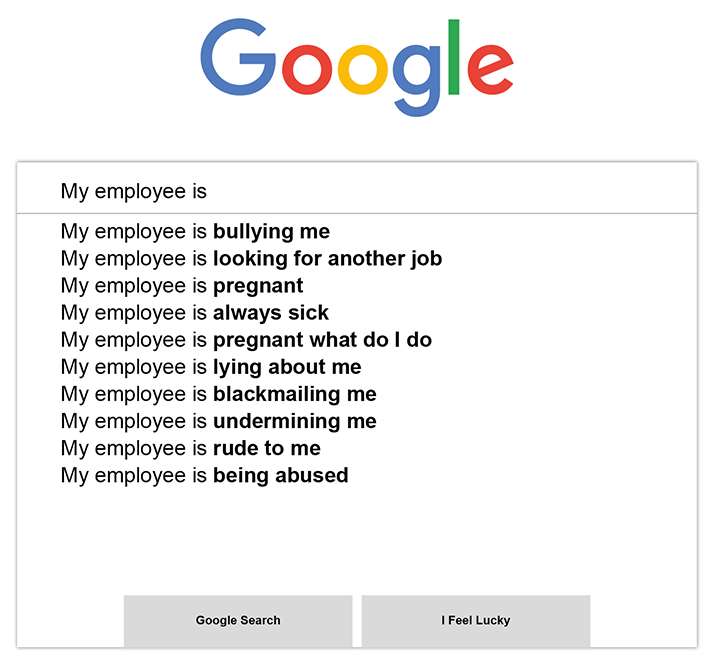Detachment: Talk to the Person, Not the Role
“The time of day that people most dislike, is the time they spend with their boss.”
Professor Lord Richard Layard, 2017
After workload and non-work related issues, the third most commonly cited source of work related stress is management style.
This rather horrifying statistic was presented at a recent Policy UK workshop on Mental Health in the Work Place, by Rachel Suff, a senior advisor for the Chartered Institute of Personnel Development (CIPD).
Suff also reported that, of the more than 1000 companies surveyed (representing 3.8million employees), only 22% of them trained managers in how to support staff, and only 20% of managers were confident to spot the early warning signs of a mental health issue. So, when Lord Layard asserts that, “managers are not doing a great job in terms of looking after their people” he’s probably right. In fact, if you search Google for “My boss is…”, on the right you’ll see the top searches.
In some respects this is not surprising. People are almost invariably promoted on the basis of technical ability. Once promoted they are likely to be given a team of people to manage, and to do that effectively, they will be trained on the company procedures to manage absence and complete the staff appraisal system. The lucky 20% will also receive some training in how to actually manage people.
Competence and having the right skill set is a key component of resilience.
Imagine how you might feel when trying to perform a task or job role that you don’t feel skilled to do. Personally, I would feel overwhelmed, useless, probably angry at being put in that position, desperate not to be found out, exhausted from trying to get it right and experiencing an enduring sense of failure because I couldn’t. How could I? I haven’t been trained! All of which would probably have me coming across as slightly crazy. If this is how 80% of managers feel, even some of the time, it is no wonder we’re in trouble. Unsurprisingly, together with autonomy, impact and meaningfulness, being skilled is a key component of resilience: the ability to be capable, confident and adaptable.
A number of years ago, I was involved in the delivery of resilience training for a senior leadership programme provided by a Russell Group University. It attracted leaders from hugely successful national and international companies. A question I asked of every cohort was: “Who believes their staff want to do well?” Without fail, only about half the group would raise their hand. When the same question was asked of the group members themselves, every single person raised their hand! It was very interesting. And not surprising then, if you ask Google what managers think of their employees, these are the top responses:
So, here we have a bunch of employees who think their managers are crazy, incompetent nightmares and a bunch of managers who think their employees are lazy idiots. It’s no wonder spending time together is the worst time of day! What’s needed is a solution that results in the top hits of a Google search revealing “My boss is…”:
Supportive
Competent
Skilled
Helpful
Insightful
Values me
Encourages me
And that “My employee is…”:
Motivated
Hardworking
Happy
Productive
Polite
Clever
The obvious answer? Ensuring managers have the skills to support their staff. This would undoubtedly involve training in areas beyond the appraisal and absence systems, and would necessarily include an understanding of basic human psychology, including mental health, motivation, communication, listening and so on. While we move towards better skilled managers, is there something we can do right now to help us create and improve relationships with our fellow human beings? Yes, there is an immediate and powerful tool at our disposal for improving key relationships at work for both managers and employees: that of detachment.
Detachment and seeing the person, not the role.
The founder of the Challenge of Change programme, Derek Roger, outlines four fundamental steps to stress free living,* the third of which is detachment. At its most basic, detachment describes our capacity to step back from our emotional responses, keep our perspective and not create a mountain out of a molehill.
In the context of this article, detachment is applied to detaching people from their roles. Let’s have a think about this more generally. For example, ask yourself this question: when meeting someone new, how quickly do you ask them what they do for a living?
For most us there is a strong sense that if we can just know what someone does, it will unlock secrets about who they truly are: teacher, accountant, police officer, nurse, business owner. I know I’m not alone when I confess to having a whole bunch of assumptions that fly round my head in response to each of those job titles. This describes attachment to a role (the converse of detachment) and it’s often this that causes many a problem at work, and in life generally. After all, who really wants to be simply defined by the job they do? I know I don’t.
We need to see the person not the role.
Recently, a young woman I know, who has been described by many as “a formidable force of nature”, went on a date with young man training to be a primary school teacher. My immediate response to her was, “I’m not sure a primary school teacher would be right for you.” Now, any primary school teacher reading this might be feeling very indignant about this statement, immediately asking, “What’s wrong with primary school teachers?” Well, actually, nothing at all. When I think of primary school teachers I think of gentle, kind, compassionate, nurturing individuals, perhaps not an ideal partnership with a “formidable force of nature”. I wonder now how many people reading this are now arguing with me? And therein lies the problem with attaching people to a role that they perform. We don’t see the person, we only see the role and anything said about the role feels personal. Unless we can detach the person from the role we are destined to respond to assumptions in our head, not the person standing right in front of us.
As managers, if we can detach our staff from their roles and meet them as individual people, our relationships will be different.
For example, if I tell myself that all the shop floor staff are lazy then the next time I meet a new member of the shop floor team, I meet a “lazy” person. I treat them as lazy and they respond in kind. What I might miss completely is that the new staff member actually lacks the necessary skills to do well, and therefore does nothing. They’re not actually lazy at all and in response to my attitude and their frustration, they’re probably beginning to nurse some resentment and behave in a negative and unhelpful way.
Relate to the person not the role: six steps to start. Next time you meet one of your reporting team:
- Meet them as if it was the first time. Let go any ideas you have already formed about them and be curious.
- Commit to finding out something more personal about them and then remember that fact.
- Ask them about their view of their job – step into their shoes.
- Feeling brave? Ask them how they see you.
- From discussions with them, try and determine whether there are any skills deficits that may get in the way of them doing their best – then commit to finding a solution together.
- Remember, you are not your job, and neither is your team.
And of course, remember to apply these steps to your own manager. After all, they are human too!



A highly experienced forensic psychologist, speaker and trainer Professor Jo Clarke is a founding Co-director of Petros. We are a not-for-profit organisation delivering training, support and learning around resilience at work and in life. Working with multi-national organisations and companies throughout the UK, including the General Medical Council (GMC), Petros is the only resilience training company in the UK to deliver Derek Roger’s acclaimed Challenge of Change programme and Dr Ross Greene’s Collaborative Proactive Solutions (CPS) training with challenging children, their parents and carers, to create happier individuals and stronger communities.
Check out our forthcoming resilience training days and Collaborate Proactive Solutions (CPS) training with children and young people.
*Roger, D & Petrie, N (2017) Work Without Stress
Photo by rawpixel.com on Unsplash





